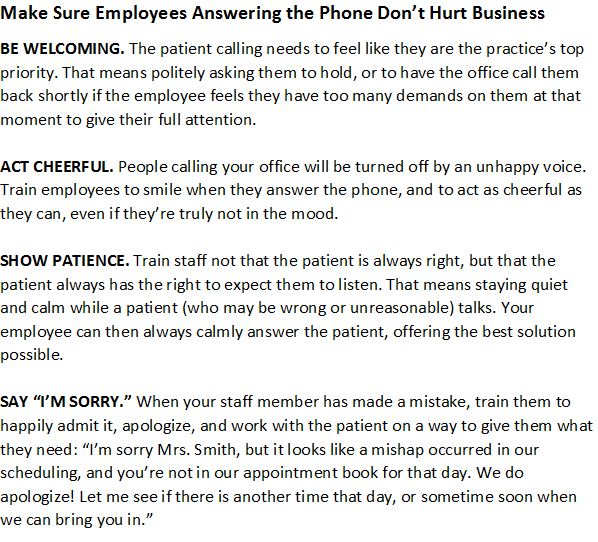By Diane Palombi, OD

May 23, 2018
Answering the phone should be an easy task for an employee, but it’s a place in the practice where a lot can go wrong, and where you have a lot on the line.
If the person answering the call in your office is unfriendly, rude, or unhelpful, it could cost you an appointment, and even create bad word-of-mouth: “I couldn’t even make an appointment there, the service is so bad.”
A recent experience in my life reinforced the importance of interpersonal skills when answering the phone in a business. Retired now from 30 years in practice, I was reminded why I always made sure my employees treated patients the way I wanted them to when answering the phone.
Here are three ways I was recently failed by a business I called, and how your employees could fail you when answering your practice phone, what they should do instead, and how you could teach it to them.
 Acting Unaccommodating
Acting Unaccommodating
I wanted to go horseback riding on my recent 60th birthday, so I made an appointment at the place where I had happily ridden on my birthday the year prior.
The reception on the phone was horrible when I made the appointment. I kept losing bits of the conversation. When I mentioned that I was having hearing problems, the employee said curtly that she was in a metal barn on a cellphone, so what could I expect?
What should have happened: If it had been me on that end of the phone, I would have been apologetic, and asked the caller to wait while I went outside to continue the conversation. If I had to remain in the barn, I would have taken the customer’s phone number, and called back when I could continue the conversation with better cell reception.
In your office: If it’s noisy in your optical, and a patient with a hearing impairment has expressed difficulty understanding, train your staff to take the time to ask if the person can hold, and then take the call in another room or outside. It’s worth reviewing what to do in this situation because, with our aging population, it’s going to become more common. Train staff never to just hang up if the person on the other end is having difficulty hearing.

Click HERE, or the image above, to read another piece by Dr. Palombi: “One OD’s Story: The Many Forms Sexual Harassment Can Take”
Being Belligerent
I thought we had agreed on 1:30 p.m. for a ride time. So, when she said to come 15 minutes early at 12:45 p.m. to fill out paperwork, I was confused, but thought that I didn’t hear her right because of the poor reception, and now the appointment was 1 p.m. That time worked for me also, so we ended our conversation.
I did not feel secure that I had gotten the right information, so I decided to contact her on Facebook Messenger. I tried to confirm the arrival and ride time. Then I asked if I could bring a friend.
I was in the middle of an appointment with an interior decorator when I got a phone call, which I ignored. Then I got another immediately, so I thought that the call must be important, so I picked up. It was the stable employee. I said that I was in a meeting, and asked if I could call her back. She immediately started yelling at me for using Facebook Messenger to contact her with ride details. I apologized and hung up thinking that this ranting was her whole response to my question. I also deleted her message.
What should have happened: She should have called me back and left a calm message confirming the day and time of my appointment, and asking that I call her back to confirm, rather than contact her again through Facebook Messenger. She then should have thanked me, and let me know the stable looked forward to seeing me.
In your office: Train staff to always keep their temper in check even if patients are, rightly or not, wearing on their nerves. Role-play exercises can help, in which one employee plays a frustrating patient on the phone, and the other practices remaining calm, and giving instructions on what they would like the patient to do, rather than becoming irate and giving up on communication with the patient.
Cancelling an Appointment Without Double Checking
The day of my birthday ride, I arrived at the stable slightly early. The place has a gate with a keypad. Last year, I called the stable on my phone and the guide came down to let me in. I got her voicemail, so I informed her that I was here. I also sent a text. After waiting for several minutes, a different employee pulled up behind me, so I pulled out of his way. He asked if I was here for a lesson, and I told him that I was scheduled for a 1 p.m. trail ride. He said no problem.
I asked if I should just follow him through, but he said, no, he wanted to notify my guide first. She would come get me. After a few minutes the guide called me back saying that she had cancelled my ride, and she was busy with a lesson. I would have to reschedule. She said that I had not called her back on Tuesday, so she cancelled me. I was very annoyed at this point. The last thing that I wanted to do was go on an hour trail ride with this person–ever. I said no thanks and hung up.
What should have happened: First, the initial woman I contacted should have never cancelled my appointment. But if she had felt the need to cancel it, she should have made sure I wanted to cancel it, and that, at the very least, I was aware ahead of my arriving that it had been cancelled.
In your office: Establish a protocol for cancelling appointments. Be sure that when employees are confused as to a patient’s request, that they always try, and re-try, to contact the patient, by phone, e-mail, and even text, if possible, to double-check that the patient wants the appointment cancelled. A patient likely won’t return to an office that has mistakenly cancelled an appointment they took time out of their day to show up for, and maybe was also counting on to renew their contact lens prescription, order new glasses, or address an eye-health concern.
How do you train employees to answer the phone? How do you ensure that the people answering your phone don’t become patient repellent spray?
 Diane Palombi, OD, retired now, is the former owner of Palombi Vision Center in Wentzville, Mo. To contact her: dlpod1@hotmail.com
Diane Palombi, OD, retired now, is the former owner of Palombi Vision Center in Wentzville, Mo. To contact her: dlpod1@hotmail.com

























